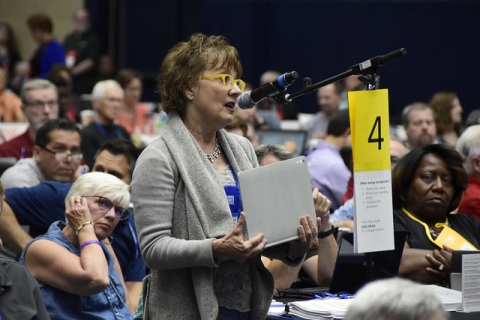In a close vote, General Synod declined to receive the Great Lakes Catechism on Marriage and Sexuality as a “catechism.” The recommendation—which was amended before adoption—was brought by the Commission on Theology.
The commission reviewed and responded to the catechism, which aims to be a teaching tool for churches and families. A series of 19 questions and answers about human sexuality and marriage, it was written by RCA minister Branson Parler.
The commission’s review was prompted by last year’s synod, which which called for reflection, study, and response of the catechism by the commission and by churches and classes.
With a vote of 116 to 100, this year’s delegates “declined to receive the ‘Great Lakes Catechism on Marriage and Sexuality’ as a ‘catechism,’” but stopped short of changing the name to the “Great Lakes Teaching Tool on Marriage and Sexuality.”
In its report, the commission commends the document for being “simply written and easily accessible,” and for offering a biblical and “holistic approach to sexuality and marriage.” The commission also believes that many in the RCA will find the document relevant and useful.
However, the commission expressed concerns with the catechism. The commission’s report explains the RCA’s endorsement of the Heidelberg Catechism over other tools that help catechize, or teach the Christian faith to believers. No other catechism, reads the report, “has reached the theological helpfulness or brilliance of the Heidelberg Catechism. In the RCA, a catechism is not just a mere teaching aid, it is an essential tool of understanding the truth found in Scripture” (emphasis original).
Additionally, the commission takes issue with some of the language of the document, such as the language of “creation order,” which it says is unintentionally contentious and “distracts from [the document’s] goal of ‘bearing witness to the kingdom of God.’” The report also notes that “in many cases, the verses offered in support of various ‘answers’ within the document do not seem relevant” and do not sufficiently explain those answers. The commission believes “the theological anthropology of the document is underdeveloped” and that gender in particular should be more fully explained within the context of the gospel story.
Read the Commission on Theology’s full response to the catechism in their paper, “Of Catechisms and Teaching Tools: The Response of the Commission on Theology to the ‘Great Lakes Catechism on Marriage and Sexuality.’”
Though the Great Lakes Catechism was commended for study last year, it is not a Standard of Unity of the RCA. The denomination’s four doctrinal standards—the Heidelberg Catechism, the Canons of Dort, the Belgic Confession, and the Belhar Confession—are part of the RCA’s Constitution.





